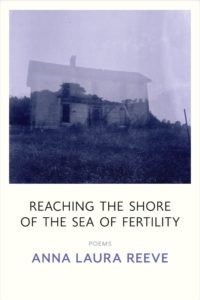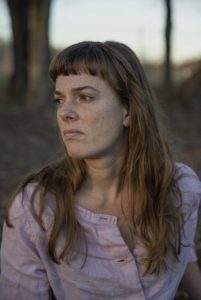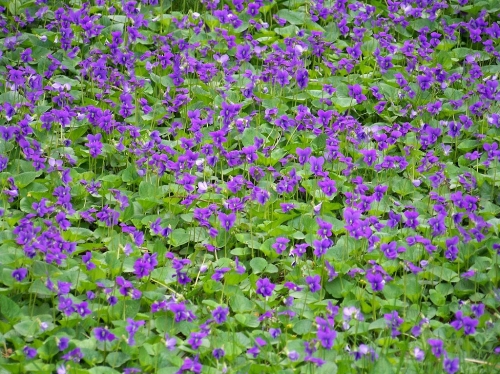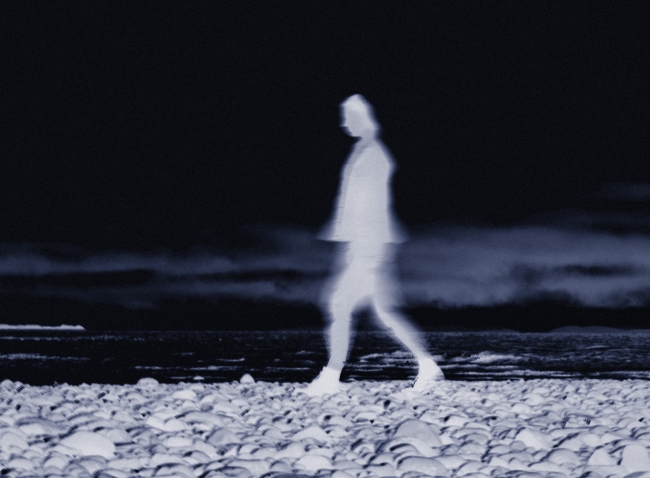
In Anna Laura Reeve’s 2023 debut collection Reaching the Shore of the Sea of Fertility (Belle Point Press), readers will be transported from the domesticity of everyday life to the wonder of the flora and fauna in the balds of Southern Appalachia. Mothers will not be able to read the first poem without recollecting those well-known early days. Reeve, a Knoxville native, is a mother poet offering myopic looks from birth through life and the devastating ways motherhood blends identity in madness, while offering hope in the ever-renewing change of nature. Only someone from this area could so easily capture the relief that comes from the wisdom of these old hills, the Smoky Mountains. The mountains and their gentle foothills are great opposing forces that counter the insecurities imposed onto new parents and to the rigid fragility of any infant. One only comes to know deep into their child’s life how truly resilient children are.
Reeve’s readers will be awakened to a brief solitude, interrupted nearly immediately by piercing alarms and early morning demands. The physical, mental, and therefore, physiological changes in Woman-become-Mother are excruciating. Still, Reeve allows softness in songbirds rising, “sparrow’s ambitious motif.” The softness is ever to be interrupted by “screaming crows.” This writer has a masterful lens, telescoping in and panning out, in one life, propelling readers from the gold sheeves of Circe to the ethereal, astrological heavenly body of the same name. And it can’t go without saying that the place is preeminent among her life, Southern Appalachia celebrated in a love song of a sonnet crown.
On the matter of form, beyond the music of Anna Laura Reeve’s lyricism, her tight, gin-clear lines are disciplined into couplets and adapted pantoum. Others are loosed into blocked erasure exhalations, ever honoring the forms of the masters and ancestors gone before her, while at the same time exploring contemporary freedom of lineation that only poetry and Heaven allow.

The collection is broken into five sections and begins overall with Reeve’s “Ars Poetica.” After that, readers are shocked to attention upon the discovery of a traumatic birth, as is every birth, even when the woman is not being torn in half, even when all goes well. Reeve surely lets readers know that birth is the trauma. Here, doctors say “blood clotted // in uterus, // bring it out by hand, . . .” and readers know that, however uncomfortable childbirth is naturally, intervention can expand both pain and worry, “this will hurt . . .”
If the reader is not a mother, Reeve’s work is clear and comprehendible. If the reader is a mother, be forewarned. Her extraordinary writing is somehow able to transport one right back in the delivery room with undiminished detail, directly back to sleepless nights that people often lie about when they say it’s just hard for the first few months; then the infant sleeps through the night. Reeve acknowledges those days, sure, but others know it is an ever after type affair. Those who are not parents may think twice before leaping into parenthood. Those who have chosen to become parents are the only ones who can possibly understand, who truly know, how worthwhile the exchange is: parentless freedom without constant worry versus a life imprisoned by it. Parents make the trade, suffer the fears, know how emphatically their child(ren) deserve better, and still, also know they are the only ones capable of parenting that particular and peculiar being. No other bird will do.
The collection of work is sensational in every aspect of seeing, feeling, hearing, tasting, and yes, even smelling. On sight, the imagery of “pelvic cavity” likened to plowed and seeded fields, “. . . clover, vetch, // rye, and oats . . .” yields not only to the peace of seeing rolling acres, but also to the sweet stink of a summer farm. And as the mother is considering the future for the child, just exactly as all mothers do, the farmer/gardener is asking of the leaf, “. . . opening yourselves, undaunted, . . . // . . . what do you want to be?” Reeve so carefully invokes emotion; one is welling up with laked eyes and a swollen heartache, before being “unsaddle[d]” and “shaken.”

Should readers feel as though they may be experiencing too closely the realness of it all, Reeve loosens the tension with the gentleness of “tiny green tongues and pink flowers,” mountain violets and laurel blossoms. Leaf mulch mixes with boxelders and the speaker “wait[s] for the rain to begin.” Just after, there is contrast in the dull beige of a female bluebird to the bright “buzzy call of the Carolina wren,” sights and sounds all intermingled. Goldenrod pairs next to ironweed and both freckle a mountainside we all know by heart. About the time one might ask if her poetry is all imagery, Reeve gives the tastes of honeysuckle, the smells of sage and fireworks and polypropylene on tomato cages, every natural thing bittered by interruption. Robins call, and catbirds with their “hoarse morning mew.” Reeve goes directly from the senses to the temporal, and to place.
Most pages will be read as this morning, found in her poem, “Playing the Washboard”:
Birdsong thins the air.
Liquid calls from cardinals criss-cross
the yard like plumes of woodsmoke
or steam from a hot cup, lit by sunrise.
Every poem is this Appalachia, from Cades Cove to Max Patch. And then there is the body, as predominant a theme as is found in “The Children of Asylum Seekers”:
All we know of our parents is in the body . . .
I knew my father’s chest because for a while
my weakness fit there, like a soft body
under hard wing casings.
Distance is placed between self and loved one. Distance is placed between growing a human and raising a human, seen here in “Entrapment”:
. . . all I had was my daughter
and the slime trails and greasy stains . . .
Distance is closed by coming home again in “Flower Moon,” “Too old, now, to chase sunset[.]”
Anna Laura Reeve takes readers through motherhood. Specifically, readers traverse parenting as a ride-along, a primary experiencer who delights in the senses and sensibilities throughout Southern Appalachia. The speaker shifts lenses, from the den to the intimacy of the womb, or the inner sanctum of sleeping quarters, to the wilds of the mountain range that stretches from Mississippi to Maine, our Appalachia. Her readers will feel at home, hugged by these very mountains, and riveted by the raw power in her poetry.
Amber Albritton has a Master of Fine Arts in Creative Writing/ Poetry and is now a lecturer at the University of Tennessee, Knoxville. She is a former Editor of Pellissippi State’s Imaginary Gardens Literary & Arts Review. Her writing has been published in Phoenix Magazine and Grist Literary Magazine. Her poem, “Privilege of Witness,” was featured on Appalachia Bare in 2019.
**Featured image by Aedrian, Unsplash, cropped
